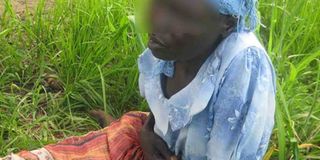Woman fights double war of nodding and HIV/Aids

Ms Lucy Akello in Tumangu, Akwang Sub-county, Kitgum District on Saturday. Photo by Harriet Anena
What you need to know:
Suffering from nodding disease is a challenge most families in Acholi Sub-region are still coming to terms with, but for 40-year-old Lucy Akello (names changed), her battle is two-fold- HIV and nodding.
Fifteen kilometers east of Kitgum town, is a 40-year-old woman, battling nodding disease and HIV/Aids. Ms Lucy Akello’s woes started in 2006, when her son, after returning from school, started nodding when he was given food.
Akello, thinking the boy was just tired after the three-kilometer walk from school, did not worry much, about his drooping head.
But when the nodding re-occurred the next day and continued into weeks and months, Akello’s unanswered questions began to cloud her mind.
Taking a trip to the health centre in Tumangu Village, Akwang Sub-county, Akello’s son was given anti-epileptic medicine to manage the nodding.
Facing a loss
The 14-year-old, taking medication, didn’t get better. He developed seizures in 2007 in addition to easing on himself, malnourishment and physical stunting.
“He was already in Primary Four but he had to drop out of school. He could sometimes get seizures and become unconscious,” Akello explains.
Even then, Akello had hope that her son could get healed. But one day, in 2009, Akello woke up to a shocking sight. “He was lying on his bed, stiff and lifeless. His face was covered in saliva,” she says.
Her in-laws, who never believed her account of the boy’s death, accused Akello of killing her son.
A few weeks later, Akello, who was by then a widower, started nodding and collapsing. “My vision would get blurred and my head spins really bad,” Akello narrates.
When she visited the health centre, Akello was given epilepsy drugs, which she has continued to take, despite the ‘minimal’ improvement.
Sometimes the seizures are at night, I wake up when saliva has run down my face or when I have eased on myself,” she explains.
As the wait for a diagnosis continues, Akello, who acquired HIV from her second husband (now late), says nodding patients should be isolated because she believes “nodding disease is contagious”.
She is also battling opportunistic diseases that come with HIV. “I get diarrhea so often, stomach ache and cough. I can’t even dig anymore,” she says.
In an appeal to the government, Akello says: “The government should provide us food, and give us medicine that will cure this disease.”
Akello is among the growing number of adults in Acholi sub-region, showing symptoms of nodding, an ailment earlier believed to affect only children between five and 15 years.
Dr Alex Layoo, the medical superintendent of Kitgum Hospital, says although, cases of nodding in adults are being reported, no confirmation of the cases, or the total number of people affected, has been compiled.
“We don’t know the complete behavior of the disease, so we can’t deny the problem in adults,” he said on Saturday, while speaking to a group of American researchers and a psychiatrist, headed by Kitgum Woman MP Beatrice Anywar.
Nodding Disease facts
What it is: Nodding disease is a physically and mentally stunting disease that was earlier affected children between five and 15 years but is now being reported in adults.
Symptoms: Nodding, seizures, malnourishment, running saliva, physical and mental stunting.
Figures: At least 300 people have died of the disease since it was officially reported in 2003. A new WHO report puts the number of people affected by nodding at 7,000 but health ministry puts it at about 3,500. Reports from affected districts indicate at least 47 adults have shown signs of nodding disease.



